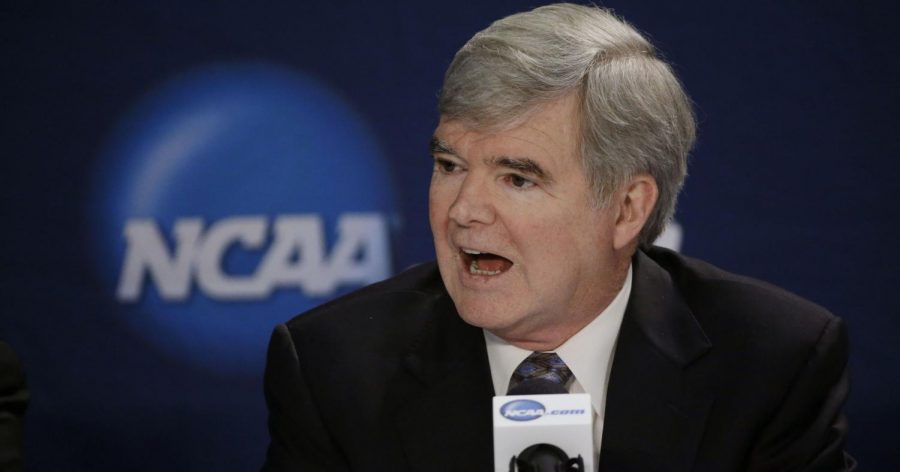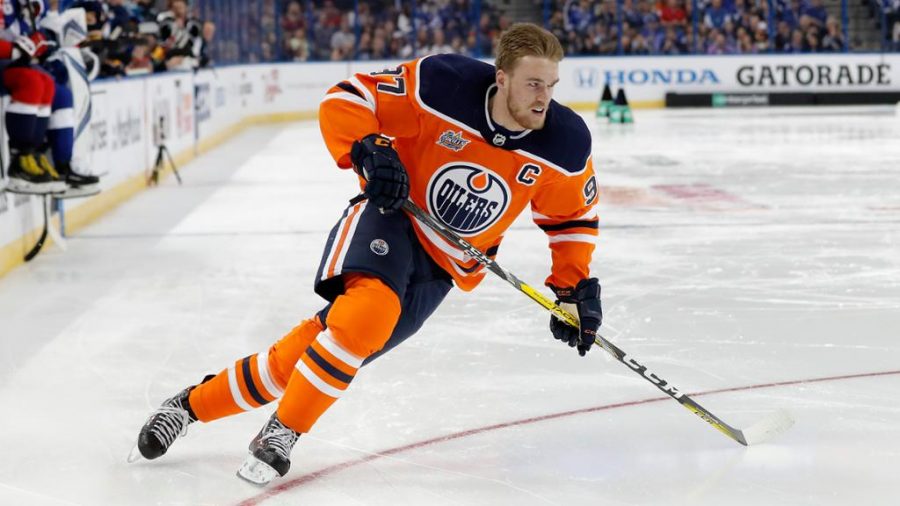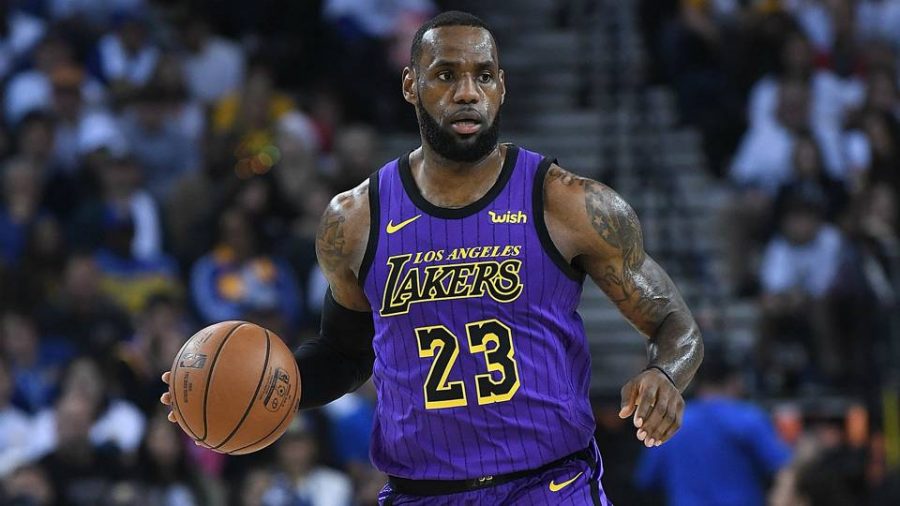NCAA president Mark Emmert discusses NCAA policies.
Opinion: Going pro too soon?
February 28, 2019
There has been a great deal of controversy surrounding high school athletes and their ability to skip college and go straight to the professionals. Though Major League Baseball (MLB) and the National Hockey League (NHL) have established rules that allow high schools athletes to be signed straight out of high school, other professional sports leagues, most notably the National Football League (NFL) and the National Basketball Association (NBA), have restricted high school athletes from entering the NFL or NBA right after high school senior graduation. In response to this debate, Tyler and I have taken two opposing sides to discuss the question, “Should high school athletes be allowed to skip college and go straight to the pros?”
Yes, high school athletes should be allowed to go pro
On the night of January 25, 2019, National Hockey League (NHL) fans around the world tuned in for the NHL All-Star Skills Competition. Even though all of the competitions (hardest shot, puck control, passing challenge, etc.) left viewers impressed, the first event stood out the most. Featuring arguably the best current NHL player, Edmonton Oilers captain Connor McDavid stepped up to center ice. The referee blew his whistle and off went one of the fastest players hockey has ever seen. The 22-year old McDavid skated around the rink in 13.378 seconds, winning his third straight NHL fastest skater competition.
The Oilers forward broke into the league at age 18. He was drafted 1st overall in the 2015 NHL Entry Draft. In his second season in the NHL, McDavid recorded 100 points with 30 goals and 70 assists. Last year, McDavid did even better, finishing with 108 points with 41 goals and 67 assists. This year, McDavid has 85 points through 58 games and is on pace to finish the season with 120 points.
McDavid’s hard work and passion for hockey have resulted in great success in Edmonton, both for himself and the Oilers organization. He has become one of the most exciting young phenoms in professional sports. At age 22, he has already registered north of 300 points and is earning an average of $12.5 million per year (he signed an 8-year, $100 contract on July 8, 2017).
Now, you may be reading and questioning why I’m narrating the life of Connor McDavid. Well, the question of whether athletes should be allowed to go pro after high school applies to Connor McDavid. During McDavid’s tenure at McDowell Senior High School in Erie, Pennsylvania, he was offered a scholarship to play hockey at Boston University. However, McDavid declined. He thought it be best for his hockey development to reject the offer from Boston University and join the Ontario Hockey League (OHL) (one of the major junior ice hockey leagues in Canada). This decision by McDavid proved effective, as he tallied 285 points in 166 games over three seasons in the OHL. Of course, as a result, McDavid gained large amounts of attention from NHL scouts. A scouting report for McDavid put it best, explaining that “you just have to watch him play one shift and it will encompass all the reasons why he’s a special talent.”
The decision to skip college and enter the professionals allowed McDavid to make the most out of his hockey gift. According to the American Time Use Survey, the average full-time university/college student spends about 3.5 hours on educational activities per day. In addition, they spend an average of 2.3 hours on work-related activities. What going straight to the professionals did for McDavid, and other incredible athletes like Wayne Gretzky, LeBron James, and Ken Griffey Jr., was it enabled him to focus all his time and energy on the sport in which he’s passionate about. McDavid felt no academic strains that have limited his opportunity to make the most out of his talent. As a result, his training and development as a young athlete have already and will forever serve him well in the years to come.
And, let’s not assume that a college degree at 22 is necessary for McDavid to be successful after future retirement. He can always go back to school. Granted, he’ll be in a much better financial situation after years of earning $12.5 million plus than if he were to attend college beforehand. For example, Kevin Weekes, former NHL goaltender, hadn’t attended college because of hockey. However, once he retired, he was able to secure a job as an NHL analyst on NHL Network. Similarly, future baseball Hall of Famer Derek Jeter never played a game on a college campus, yet he was able to co-purchase the Miami Marlins and become one of their owners.
You see, opportunities exist for athletes with or without a college degree. Therefore, it’s important that society not disallow a young athlete’s incredible potential. Instead, they should acknowledge it, for it would guarantee an individual great financial security as well as a memorable impact on society at a relatively young age.
No, high school athletes should be required to go to college
Names like LeBron James, Kobe Bryant, and Tracy McGrady are widely known throughout the basketball world. These players are considered some of the best to ever play the game, but the one thing that makes them even more unique? They went pro straight after high school and decided to skip college as they felt they were ready for the size and maturity of the pros. While there is a long list of players from leagues like the NHL, and MLB only a select few find long term success in the pros.
The NBA requires at least one year of college or players be at least 19 years of age before entering their name into the draft. The NFL, on the other hand, requires players to have at least 3 years of college experience before entering their name into the draft. The NBA does allow players who are unsure whether they want to or can make it pro to enter their name but not hire an agent. Once a player hires an agent they are no longer eligible to return to college. The same applies to the NFL, the main reason being that a college athlete is not allowed to receive money in any sort of manner.
Unlike Brandon, I believe that these rules are necessary and that a player should be required to play at least one year in college before going pro. The level of high school competition is completely different from that of the pros. Yes, every once in a while you would come across a generational talent like LeBron James (NBA), Mike Trout (MLB) and Connor McDavid (NHL) who have all won an MVP award in their respective sports. In the pros, athletes are a lot more competitive, stronger, faster, bigger and for the most part more matured. I believe these rules are part in place for both the safety of the athletes and the overall quality of life. Adjusting to a professional athlete lifestyle can be hard for even those that completed all four years of high school. You don’t just have to worry about going out and competing, you also have to worry about your financial management, owning a place, and in some cases even providing for a family.
All in all, I do believe some players are physically and mentally prepared to go pro but I find it in their best interest to go to college which is designed to prepare athletes for professional play and life. Recently, star basketball player Zion Williamson of the Duke Blue Devils was injured not even a minute into the game against the North Carolina Tar Heels. This once again brought up the issue of players risking their careers for college. As well it brought up the issue of college athletes not being paid as the cheapest ticket for the game was $2,500, but that’s a discussion for another time.



